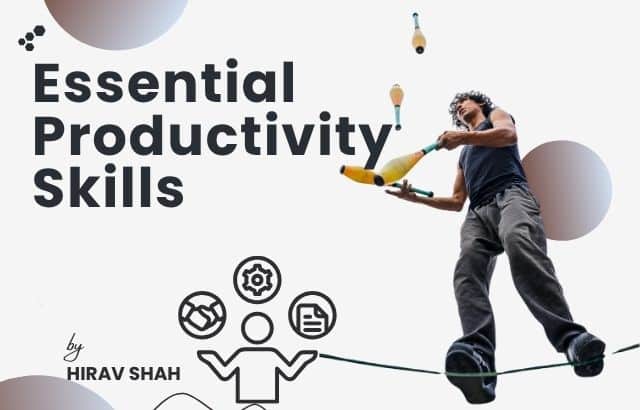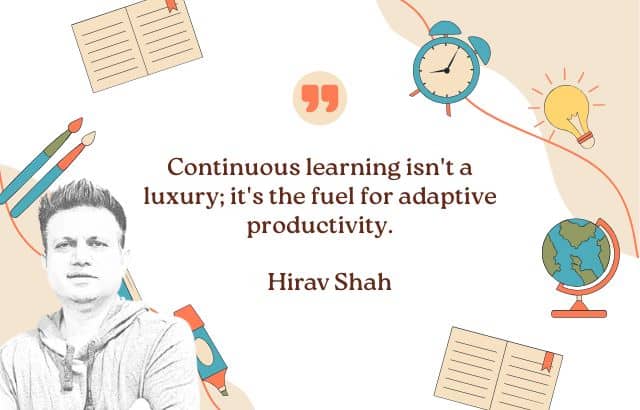Mastering productivity skills is no longer optional — it’s essential for success. With technology transforming the way we work and live, knowing how to manage your time, make smart decisions, and prioritize effectively can make all the difference in achieving your goals.
We live in an age where computers and automation outperform humans in executing routine tasks at extraordinary speeds. With the help of our smartphones, we can access an endless pool of information instantly — a capability that would have made us seem like geniuses in 1940. This shift has redefined what it means to be a productive and valuable professional in both business and life.
Gone are the days when memorizing facts and formulas were the defining aspects of intelligence. Today, the real value lies in developing skills that enhance our adaptability, focus, and ability to manage time effectively. Below are the critical productivity skills that everyone, regardless of their profession or gender, should master.
As Hirav Shah, a renowned business strategist and The Game Changer, highlights, these skills are not only valuable but necessary for thriving in modern business environments.
Table of Contents
1. Interpersonal Skills: Building Lasting Connections
The ability to create meaningful relationships, maintain a network, and leverage those contacts when needed is crucial for personal and professional success. Whether you’re a business leader, an entrepreneur, or an employee, strong interpersonal skills enable you to connect with others, build trust, and collaborate effectively.
Example: A business strategist like Hirav Shah often builds and maintains an influential network of industry leaders and experts. By cultivating these relationships, they gain access to new opportunities, insights, and collaborations that can elevate their career or business ventures.
Tip: Attend networking events, engage with people on professional platforms like LinkedIn, and keep in touch regularly. Building relationships takes time, but the benefits are substantial.
2. Presentation Skills: Conveying Ideas with Impact
No matter your role, being able to present ideas clearly and persuasively is essential. From business pitches to team meetings, your ability to articulate your thoughts can make a significant impact on your career. Strong presentation skills not only improve your communication but also boost your confidence and influence.
Example: Hirav Shah, when advising top executives, often emphasizes the importance of crafting compelling presentations that not only deliver facts but also tell a story that resonates with the audience. This is especially important for entrepreneurs and business strategists who need to convince investors or clients.
Tip: Practice in front of a mirror, record yourself, or rehearse with a friend. The more you practice, the more natural your delivery will become.
3. Time Management: Maximizing Your Day

Time is the most limited resource we have. How you choose to spend it has a direct impact on your results. Mastering time management involves organizing your tasks, eliminating distractions, and focusing on activities that move you closer to your goals.
Example: Business strategists like Hirav Shah often manage multiple projects simultaneously. They rely on techniques such as time-blocking, prioritizing tasks, and delegating to maintain high productivity levels without burning out.
Tip: Use productivity tools like Trello or Asana to organize tasks and set clear deadlines. Break large projects into smaller, manageable tasks to avoid feeling overwhelmed.
4. Prioritization: Focusing on What Matters Most

We all face moments where we have to choose between competing tasks. The ability to prioritize based on your objectives is critical. Understanding the impact each task has on your larger goals allows you to allocate resources — time, energy, and effort — in a way that maximizes productivity.
Example: When working on a business strategy, Hirav Shah often prioritizes projects that offer the highest return on investment (ROI) for clients. By assessing which tasks align most closely with business goals, he ensures that efforts are directed toward the most impactful areas.
Tip: Use the Eisenhower Matrix to categorize tasks by urgency and importance. This simple tool helps you decide what to focus on and what can be delegated or postponed.
5. Listening Skills: The Art of Understanding

In today’s fast-paced world, the ability to listen effectively is becoming increasingly rare. Yet, it remains one of the most valuable skills you can develop. Listening not only helps you understand others’ perspectives but also fosters better communication, trust, and problem-solving.
Example: In his advisory role, Hirav Shah listens carefully to his clients’ needs, goals, and challenges before recommending solutions. This enables him to offer tailored advice that truly addresses their concerns.
Tip: Practice active listening — focus on the speaker, refrain from interrupting, and ask clarifying questions. This shows respect for others and helps you gather more insightful information.
6. Money Management: Building Financial Intelligence
Effective money management is not just about budgeting; it’s about developing a mindset that values savings, investments, and financial growth. In a world driven by consumerism, it’s easy to fall into the trap of living paycheck to paycheck. However, those who develop good financial habits early on are better prepared for the future.
Example: Business strategists often advise their clients to invest wisely and save for the long term, ensuring that financial decisions are aligned with business goals. Hirav Shah emphasizes the importance of understanding financial statements, cash flow, and smart investments.
Tip: Start small. Set aside a percentage of your income for savings and investments. Consider talking to a financial advisor to develop a personalized plan.
Final Word: Embracing Continuous Learning and Adaptability
As technology continues to automate many tasks, the role of humans will increasingly be focused on higher-level decision-making. Business strategists like Hirav Shah believe that human decision-making, with its nuances and understanding of broader implications, will be the key differentiator in the workplace of the future.
Key Skills for the Future:
- Time Management
- Goal Setting
- Prioritization
- Focus
- Adaptability
- Stress Management
- Continuous Learning
By honing these skills, you can navigate the complexities of the modern workplace and achieve both personal and professional success. Remember, while machines may outperform us in many areas, it’s human decision-making that will always hold the power.
FAQs on Essential Productivity Skills
Q: How can I improve my time management skills?
A: Start by tracking your time for a few days to identify where you spend it. Use tools like calendars and task management apps to organize your day. Break tasks into smaller steps and prioritize them.
Q: What are the most important skills for a business strategist?
A: Critical skills for business strategists include problem-solving, communication, leadership, financial acumen, and adaptability. They also need strong interpersonal and presentation skills to work effectively with clients and teams.
Q: Why is listening so important in business?
A: Listening helps you understand the needs of others, build trust, and make better-informed decisions. It also enhances collaboration and reduces misunderstandings.
Q: How can I stay productive while working remotely?
A: Set clear boundaries between work and personal life, create a dedicated workspace, and use productivity tools to stay organized. Stay connected with your team regularly through meetings and check-ins.
Q: What should be my first step in managing my finances better?
A: Start by creating a budget. Track your income and expenses to understand where your money goes. From there, focus on saving and investing a portion of your income each month.
Here is the same content with all HTML removed and clean, professional formatting:
Essential Productivity Skills for Modern Professionals
by Hirav Shah
Quote 1: “Productivity is not about doing more; it’s about focusing on what truly moves the needle.”
Explanation
In today’s fast-paced world, professionals often fall into the trap of multitasking, leading to diluted efforts and burnout. Hirav Shah emphasizes that true productivity comes from identifying high-impact activities aligned with core goals instead of spreading oneself thin across low-value tasks.
Strategy
Use the Eisenhower Matrix to categorize tasks into urgent/important quadrants. Prioritize the top 20% of tasks that generate 80% of your results (Pareto Principle).
Execution
Set aside 30 minutes every Friday to review, eliminate, or delegate non-essential tasks. Use tools like Trello or Notion to track and visualize only needle-moving work.
Quote 2: “Master your energy, not just your time—peak performance demands peak vitality.”
Explanation
Time management alone is not enough. Professionals burn out when they ignore their physical, mental, and emotional energy levels. Hirav Shah reminds us that sustainable productivity requires managing energy, not just hours.
Strategy
Use the Pomodoro Technique paired with intentional energy resets: 25-minute focus sessions followed by 5-minute breaks. Add daily rituals such as meditation, light exercise, or deep breathing to recharge.
Execution
Track your energy patterns for a week using a journal or apps like RescueTime. Schedule deep-focus tasks during your peak energy hours and save lighter tasks for slower periods.
Quote 3: “Automation is the silent accelerator of productivity in the digital age.”
Explanation
Repetitive tasks drain mental bandwidth. According to Hirav Shah, leveraging automation frees up valuable cognitive resources for strategy, creativity, and innovation.
Strategy
Identify 3–5 repetitive tasks you perform daily—such as email sorting, file organization, or data entry—and automate them using tools like Zapier, IFTTT, or custom AI scripts.
Execution
Start with one small automation this week. Test it for a day, refine it, then scale up gradually. Review your automation stack monthly to ensure you’re saving 1–2 hours per day.
Quote 4: “Saying no is the ultimate productivity hack—guard your focus like a fortress.”
Explanation
Modern professionals face a constant stream of interruptions—meetings, messages, and requests. Hirav Shah stresses the importance of protecting your time by declining tasks or opportunities that don’t align with your priorities.
Strategy
Create a decision filter: Ask yourself, “Does this align with my top 3 goals?” If the answer is no, decline politely, offering alternatives like: “I can revisit this next quarter.”
Execution
Check emails only twice a day and set up auto-replies to protect boundaries. Build the habit of saying no by practicing in low-stakes situations first.
Quote 5: “Continuous learning isn’t a luxury; it’s the fuel for adaptive productivity.”
Explanation
Industries evolve fast, and outdated skills slow you down. Hirav Shah emphasizes that ongoing learning is crucial to staying effective and avoiding rework or inefficiencies.
Strategy
Dedicate 1 hour daily to structured learning using micro-courses on platforms like Coursera, Udemy, or LinkedIn Learning, focusing on skills directly relevant to your role.
Execution
Build a 90-day learning plan with measurable outcomes—such as applying at least one new skill per week. Track progress in a personal dashboard, and immediately implement new skills in real projects
















